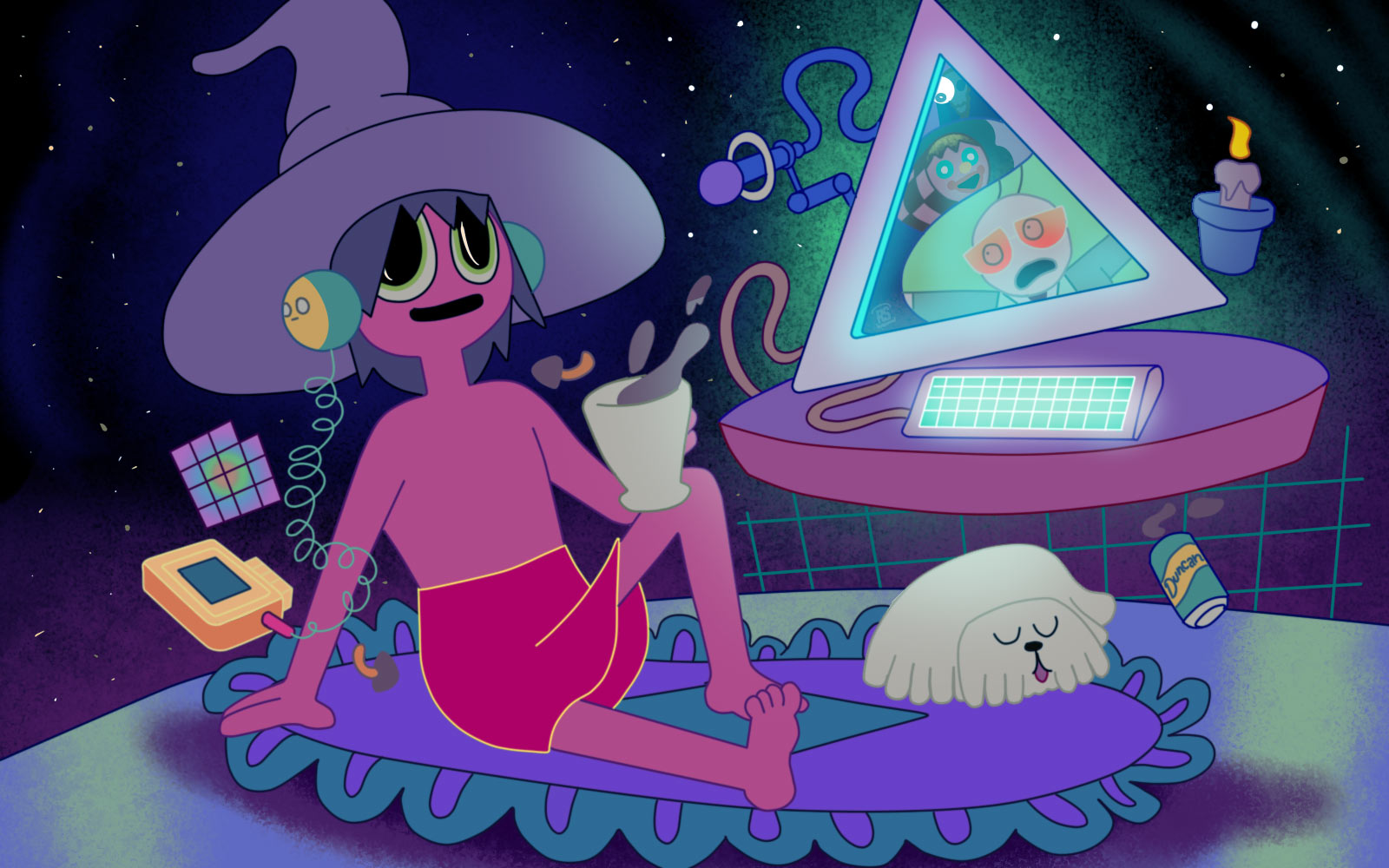It seems Netflix has a show for just about anyone, from psychonauts to straight-edged people and everything in between. The Midnight Gospel, the brainchild of comedian Duncan Trussell and animator Pendleton Ward, takes audiences on the trippy hero’s journey of space podcaster Clancy Gilroy. Alongside audio derived from episodes of Duncan Trussell’s podcast, Clancy acts as an avatar for Trussell as he explores different universes, interviewing locals and, ultimately, comes to terms with the beauty and pain within his own life. Though a large portion of the show follows Clancy on various adventures — entering an underwater world overrun with cats or attempting to travel to a planet known for its orgies and margaritas — there is an overall larger plot involving Clancy’s personal life, relationships and livelihood. The show discusses the therapeutic and spiritual components of psychedelics but, more so, the show paints a parallel of escapism through substance or in Clancy’s case, reality simulation. So, let’s explore the show, psychedelics and escapism.
Show Synopsis and History
Netflix picked up The Midnight Gospel in 2019, but Trussell and Ward began their collaborative friendship in 2013 after Ward heard a riveting episode of Trussell’s podcast, The Duncan Trussell Family Hour. Ward suggested the idea of an animated show, thus inspiring the pilot episode in which Clancy journeys to an alternate earth under zombie invasion and interviews the president, voiced by Dr. Drew Pinsky. The pilot was well-received, and the show aired an eight-episode first season that garnered positive professional and public reviews.
Warning: Spoilers Ahead.
Who is Duncan Trussell?
Duncan Trussell is an American stand-up comic, actor and podcast host. He is also a passionate advocate of psychedelics, accredditing them to much of his personal discovery and journey towards healing. He sees psychedelics as a vehicle for people to face traumas and hardships that lie unprocessed in their subconscious. In the midst of a psychedelic trip, the ego dissolves, allowing people to process memories and run scenarios in novel ways. New outlooks on old patterns can help people, like Trussell, accept or gain perspective. Trussell’s personal journey is reflected through The Midnight Gospel’s protagonist Clancy, who he also voices. The first season culminates in a tear-jerking episode where Trussell interviews his own mother, and processes both her life and battle with terminal cancer. Amidst this touching conversation with his mother, Clancy’s world is literally crumbling around him, and the galactic police forces are hot on his tail. This type of intimate exploration is common amongst Duncan Trussell’s work. Death and existential pondering are common themes in both his stand-up comedy and podcast.
Who is the Animator?
Pendleton Ward is an American screenwriter, producer and animator most famously known for his Emmy Award-winning show Adventure Time. He often draws inspiration from iconic cartoons like The Simpsons and anime like My Neighbor Totoro. The simple color coordinated characters and darkly existential storylines echo the storylines of the Simpson crew in Springfield. The animation of the environment and background is rich with detail, and the characters emote with characteristically anime facial expressions and eyes.
The Hero’s Journey
The Midnight Gospel follows a loose framework reminiscent of the classical archetype of the hero’s journey, made up of a few steps.
A hero begins in a context where they are presented with a call to adventure. Often the hero refuses the call, feeling incapable or in need of support. The hero seeks out mentorship, sometimes in the form of a guide or a talisman possessing mind or ability-expanding powers. They face enemies and tests both externally and internally as they battle a soul conflict and progress towards their impending battle. Often, after conquering some sort of foe, the hero gains a reward that allows them to go on and face their final clash with destiny. The final battle includes some sort of death — metaphorical or physical — and concludes with a resurrection allowing the hero to go on into their future.
Clancy follows this narrative arc as he begins his journey in his comfortable trailer, dreaming of making it big as a space podcaster. In each episode he enters a simulation that allows him to accompany someone else on their own journey towards enlightenment but ultimately returns to his home, festering with inadequacies and everyday monotony.
As Clancy journeys into these simulations, he meets many mentors and collects shoes from each planet, adding them to his collection of talismans. The simulated enemies and battles, which Clancy witnesses, are all met with curiosity and companionship, whereas the challenges in his real-life are isolating and mundane. Clancy explores the intricacies of forgiveness, suffering and death, and disregards notifications from his simulator that it is in need of maintenance and repair. He dodges calls from his sister, who reluctantly loaned him money on the stipulation he not spend it on a used reality simulator. As bounty hunters search him down, and his neighbor seeks to murder him, Clancy goes into his reality simulator and witnesses other creature’s births and resurrections as they face the conflicts in their own lives.
Ultimately, armed with the talismans of his travels, Clancy meets his mother and discusses the grief and loss surrounding her impending death. This climaxes in a cartoon birth scene where Clancy, who has aged over the episode, births his own mother into infancy and watches as she disappears into the multiverse. While Clancy approaches spiritual nirvana with his mother, the simulator is overheating, threatening to destroy everything around it. Arriving back at his trailer, just in time, Clancy is able to escape into this simulator before it explodes and finds himself at a bus station. He finds a bus full of all of his mentors and interviewees from past episodes, and he settles into a seat next to Pendleton Ward’s rendition of Ram Das.
When Clancy presses Ram Das on where the bus is going and whether or not he is dead, Ram states that he can only be here now. Finally, Clancy begins to understand the importance of real presence in his own life as well as the consequences and benefits of escaping into alternate realities.
Escapism
Clancy’s frustrations with his everyday life are a common experience. The grind of life’s constant array of obstacles can be exhausting, and the attraction of escape is present throughout the human species. When people are burnt out, anxious or experiencing low self-esteem, escapism provides an easy coping mechanism. Whether it be video games, social media or substance use, escapism allows people to forgo their everyday worries for an altered reality.
Clancy is unable to deal with his own life, and he finds his simulation experiences to be valuable not only for himself but as content for his spacecast. These adventures do not feel pointless to him, yet they cause him chaos in real life. Ultimately, the simulator explodes, pushing Clancy into a new reality with unknown implications and no known way to escape.
The lesson Clancy finally learns is one of presence. He finds himself sitting with the hard feelings surrounding his mother’s death, finally acknowledging his sister and her love for him, and even reaching a profound understanding of himself.
In episode five, “Annihilation of Joy,” Clancy enters a soul prison full of prisoners stuck in a painful purgatory of evaluating their life and choices. In a musical finale, a prisoner finally regains their voice and sings, via the voice of Johanna Warren, “Freedom is what happens when you take off your prisoner disguise.”
The traps of cyclic thought can leave people stuck in behavioral stagnation. A prisoner to their own choices whether it be towards escapism or any other human inclination. All people are capable of coping with their present suffering by escaping into a prepared narrative.
Some would see religion as an example of this. It’s a way for people to interpret the everyday realities of life and provide an escape from the existential questions of who they are and why they are here. Escapism allows people relief from the crushing notion that ultimately they and everyone they love will die. Psychedelics pose both the potential for escapism and access to mind-expanding talismans that people can carry through their life and into death.
Midnight Gospel and Psychedelics
While traversing the delicate ribbons of the multiverse, Clancy often finds himself discussing psychedelic substances during his interviews. In the first episode, while in a world overrun by zombies, Clancy interviews Dr. Drew Pinsky. While they evade a zombie horde, they discuss the moralization of substances. When Clancy, or Duncan Trussell, labels pharmaceutical sleeping pills “evil” President Dr. Drew professes that it is not the drug itself that is evil, as it is nothing but a chemical substance.
Just like any other substance is nothing more than a collection of molecules that may have psychoactive effects. Pinsky describes health as the accepting, perceiving and dealing with reality on reality’s terms.
While in the soul prison, Clancy interviews a soul bird who is forced to have their feathers plucked and weighed for the sins of a prisoner. Voiced by Jason Louv, the bird describes how his experiences with DMT allowed him to process the loop of suffering created by avoiding pain in life. There are truths to being alive that are inherently challenging: the inevitability of death and suffering. The bird outlines the journey of accepting how things are and testifies that psychedelics can be a helpful tool.
As Clancy begins to face the consequences of neglecting his life for the simulator, the computer says Clancy is avoiding dealing with the real world by escaping to his computerized simulations. He recommends Clancy visit a meditation guide named David Nichtern on a nearby planet, and Clancy refuses until he accidentally falls into the simulator and consequently, a conversation with David. His inability to deal with his present reality causes him an immense amount of suffering.
Psychedelics are powerful tools that can allow people to heal and enjoy their own lives. The value is found not only in the psychedelic trip, but also in the gateway towards expanded consciousness and new discovery. Clancy learns, from David, the powers of mediation, the risks of corking the mind and allowing the infinite swarm of thoughts to rule the human experience. Mediation is an incredibly powerful tool that allows the body to calm the central nervous system and promotes higher clarity in thinking. This exploration can be aided by psychedelics. Research shows positive associations between psychedelic use and mental health.
As the first season comes to a close, Clancy and his mother explore ego death, a prominent psychedelic concept. They describe it as a lowering of the human defenses against the true pain and ecstasy of love. A fragile ego serves to protect only itself and fails to look into the abyss of possibilities and pleasures. By dissolving the ego, people have the potential to connect with a less encumbered form of self. This experience hopefully allows them to live life with more ease and less need for escape.
The Midnight Gospel tells the story of a seeker attempting to navigate the intricate balance of escape and presence. Though escaping from life provides an opportunity for Clancy to learn valuable life lessons, it is only beneficial to him when he uses the experience to understand his own real-life beyond the simulation.
The thematically psychedelic elements of the show allow viewers to normalize psychedelics into the conversation surrounding presence. How can these powerful tools better equip the heroes of the universe to embark on their own journeys toward true presence?
Psychonaut Thoughts?
Have you tuned into The Midnight Gospel? Let us know in the comments below if you see any themes of escapism and more broadly, how do you think psychedelics fit into the conversation? If you enjoy content about the newest psychedelic media feel free to subscribe to our newsletter for updates on the newest psychedelic culture.















